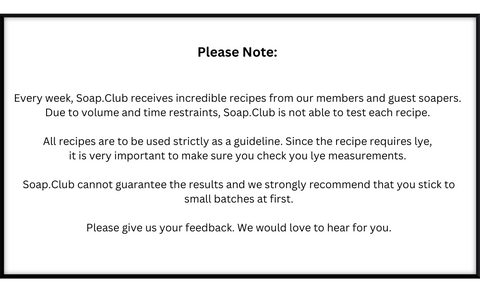Coconut Oil Benefits In Soap | Skin Nourishing Qualities | Soap.Club
Posted on October 04 2022
Coconut Oil In Soap
Coconut oil is an edible vegetable oil that comes directly from coconut palm tree fruit (Cocos nucifera). While coconut oils are used for cooking and offer many health benefits, they also offer many benefits to the skin and hair. The oil has been used for centuries as a natural skin and hair care remedy.
The indigenous people of the tropical islands where coconuts grow have long recognized the unique properties of this versatile oil. Coconut oil is especially beneficial for the skin because it is rich in lauric acid, which has both anti-bacterial and anti-inflammatory properties.
The use of the oil in soap dates back to ancient times when it was used as a cleansing agent by the people of Polynesia and other Pacific Island cultures. Another advantage of coconut oil was that it was also a popular ingredient in traditional Indian Ayurvedic medicine. More recently, coconut oil has become a popular ingredient in natural and organic soaps and skin care products.
Table of Contents
- The Varieties of Pure Coconut Oil
- Coconut Soap Benefits For The Skin
- How To Use Coconut Oil For Skin Care?
- Basic Coconut Oil Soap Recipe
- Frequently Asked Questions About The Benefits of Coconut Oil
- The Final Word On Coconut Oil Benefits In Soap
- Soap.Club's Commitment To Quality And Our Promise Of Purity
|
Take A Look At The Amazing Fragrances of the Natural Coconut Oil Soap from Soap.Club |
The Varieties of Pure Coconut Oil
There are several varieties of coconut oil to select from. The majority can be classified as refined or unrefined (also known as virgin oil).
For the greatest coconut oil benefit, use only pure oil on your skin. Look for products that are labeled "cold pressed" and avoid those extracted using chemical solvents.
|
|
Coconut Soap Benefits For The Skin
Studies have shown the following benefits of coconut oil:
Check Out Our Collection of Natural Bar Soaps for Men on Soap.Club |
How To Use Coconut Oil For Skin Care?
You can get some of the many benefits of coconut oil for skin care in many different ways.
Best DIY Coconut Oil Soap Base Recipe Formula
Ingredients
To make a coconut oil soap, you will need:
1 cup coconut oil
1 cup distilled water
1/2 cup lye
Instructions
Coconut Laundry Detergent
Coconut laundry detergent is an all-natural alternative to commercial detergents. It is an eco-friendly choice, being made from 100% natural, plant-based ingredients such as coconut oil, baking soda, and essential oils.
The unique combination of these ingredients makes it powerful enough to break down dirt and stains while still remaining gentle on fabrics. Unlike other detergents, it is free from harsh chemicals and dyes that can be found in commercial detergents, making it an ideal choice for those with sensitive skin or allergies.
Additionally, its natural ingredients are also beneficial to the environment as they break down easily and help reduce pollution. Coconut laundry detergent is also a cost-effective option due to its long-lasting results and ability to clean effectively with only a small amount of product.
By switching to coconut laundry detergent, you can make an eco-friendly choice while still maintaining the cleanliness of your clothes. It is perfect for those who want to keep their home as green and sustainable as possible!
Disadvantages of Coconut Oil Soap
Although coconut oil soap has many benefits, there are also some drawbacks to using it.
- First, coconut oil soap can be more expensive than other soaps. This is because it takes more time and effort to produce the required fatty acids to make this type of soap. Additionally, depending on where you purchase your coconut oil soap, it may contain additives and fragrances that could irritate your skin.
- Second, since coconut oil soap is a natural product, it doesn’t always last as long as other soaps. The shelf life of the soap may be shorter than other forms of soap, so you will need to use it more often.
- Finally, coconut oil soap might not be suitable for everyone. People with sensitive skin may find that the soap's lauric acid irritates them and causes breakouts or allergic reactions. It is important to always test a small patch of your skin before using any new product.
Frequently Asked Questions About The Benefits of Coconut Oil
Why is coconut oil used in soap?
Coconut oil is used in soap making because it is a good source of lauric acid, which has antimicrobial properties. This acid also helps to keep the skin hydrated and can help to reduce inflammation.
Is coconut oil soap good for my skin?
It is good for all skin types, including sensitive skin. It is an excellent choice for people who have eczema or psoriasis.
Can I use coconut oil in soap on my face?
Yes, you can use coconut oil soap on your face. It is a gentle, effective cleanser that can be used on all skin types.
Do I need to add anything to the cold process soap coconut oil soap recipe?
No, you do not need to add anything to the recipe. However, you may want to add essential oils for fragrance or colorants for aesthetic purposes. You can also use other emollients like shea butter and cocoa butter.
Can coconut lighten skin?
Coconut oil can help to whiten the skin by reducing inflammation and increasing hydration. It can also help to reduce the appearance of scars and dark spots.
Does coconut oil clog pores?
No, coconut oil does not clog pores. In fact, it can actually help to cleanse the pores and remove dirt and bacteria.
Is coconut oil good for wrinkles?
Yes, coconut oil is good for wrinkles. It helps to improve the skin's elasticity and reduce the appearance of fine lines and wrinkles.
Is natural soap made with coconut good for dry skin?
It is excellent for dry skin. It helps to hydrate the skin and can also help to reduce the appearance of scars and stretch marks.
Does coconut oil have SPF?
No, coconut oil does not have an SPF. However, it can help to protect the skin from UV damage by reducing inflammation and increasing hydration.
How long does homemade coconut oil soap last?
Homemade soap will last for several months if stored in a cool, dark place. You can extend its shelf life by adding a preservative such as a vitamin E or rosemary essential oil.
Is soap made with coconut antibacterial?
Yes, coconut oil soap is antibacterial. The acid in coconut oil helps to kill bacteria and can also help to prevent the growth of fungi.
What is solid coconut oil?
It is a type of oil that is solid at room temperature. It is rich in saturated fats and has a variety of uses, including as a skin moisturizer, hair conditioner, and cooking oil. It can also be used to make homemade soap.
What is saponified oil?
Saponified oil is a type of oil that has been processed by combining it with an alkali, such as lye. This process causes the oil molecules to bind together and form soap. Saponification is used in various products, including soaps, shampoos, and laundry detergents.
What is caprylic acid?
Caprylic acid is a type of fatty acid found in coconut oil. It has antimicrobial properties and can help to keep the skin hydrated. Caprylic acid is also an ingredient in some commercial skin care products.
Where can I buy bulk coconut oil for soap-making?
Here's the link to a site where you can buy bulk, certified organic coconut oil for making soap.
How much coconut oil should I use in soap?
The amount of coconut oil you use in soap depends on your choice of soap and your preference. Generally, 20-30 percent of your total oils should be made up of coconut oil to ensure that the bar is cleansing and bubbly.
Adjust the percentage down if you want a softer bar with more conditioning properties. If you want a harder bar with more cleansing, adjust the percentage up.
Can you apply coconut oil on the skin after a shower?
Yes, you can apply coconut oil on your skin after a shower. Coconut oil is packed with antioxidants and is known for its moisturizing effects. It helps nourish skin, protect against environmental damage, and may even help reduce the appearance of wrinkles.
To use it after a shower, simply take a generous amount of coconut oil and massage it into the skin. Not only will it help lock in moisture, but it will also leave your skin feeling smooth and soft. Be sure to use a gentle, circular motion when applying coconut oil to ensure even coverage. For best results, apply the coconut oil immediately after getting out of the shower for maximum hydration.
The Final Word On Coconut Oil Benefits for Skin In Soap
Coconut oil in soap has many benefits for the skin, including cleansing, moisturizing, and providing antibacterial and antimicrobial properties. It is also an affordable, natural alternative to expensive commercial skin care products.
You can use coconut oil in a soap bar to improve the skin's elasticity, make the skin softer and smoother, and help treat acne and other skin conditions.

|
Soap.Club's Commitment To Quality And Our Promise Of Purity
All of our products are handmade in small batches with only the finest ingredients including coconut oil.
Our goal is to provide you with the highest quality, organic, all-natural handmade soap bar for a creamy lather.
If you have any questions or concerns about our products, please don't hesitate to contact us. We're here to help!

You can get a coconut and olive oil soap recipe here.
You can learn a lot more from the posts on our blog or just follow the links below for individual posts.
How To Use Essential Oil For Soap-Making
Molding Soap: The Best (And Inexpensive) Soap Molds
Benefits of Cold Process Soap Making
Natural Acne Remedies: 11 Effective Home Treatments: Part One
7 Proven Benefits and Uses of Olive Oil Soap
Best Organic Soap Base: Our Complete Guide To Using Melt-And-Pour Soaps
How To Make Pure White Natural Soap From Goat Milk Recipe
Natural Face Remedies for Acne Vulgaris: Part Two
Soap Calculators: Lye Soap Recipes, SAP Values, and Formulations





Follow Us